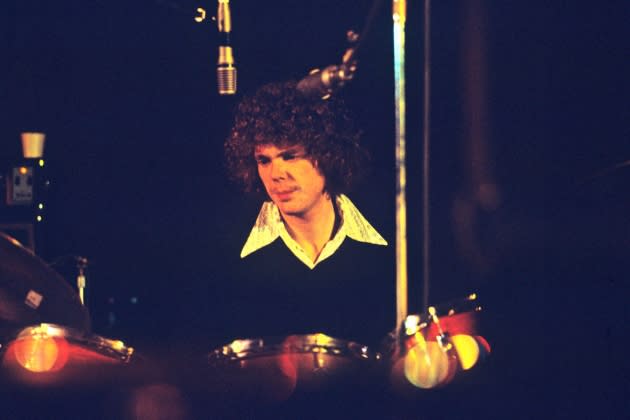Jim Gordon, Eric Clapton Drummer Convicted of Murdering Mother, Dead at 77

Jim Gordon, a drummer who played on Derek and the Dominos’ Layla and Other Assorted Love Songs and the Beach Boys’ Pet Sounds, died Monday at the age of 77. The musician, who was diagnosed with schizophrenia and was serving a prison sentence for killing his mother in 1983, died in a state-run medical facility in Vacaville, California. Publicist Bob Merlis confirmed Gordon’s death in a statement, adding that Gordon died of natural causes.
In addition to his incredible catalog of recordings, Gordon is also known for sharing a songwriting credit on “Layla” with Eric Clapton, as he was credited for the song’s famous piano coda. (Organist Bobby Whitlock has since claimed that Gordon plagiarized the part from something Gordon’s ex-girlfriend, Rita Coolidge, had written. Coolidge also accused Gordon of physical abuse.)
More from Rolling Stone
Bobby Caldwell, 'What You Won't Do for Love' Singer, Dead at 71
South Africa Rapper Costa Titch Dies After Collapsing Onstage at Music Festival
Robert Blake, 'Baretta' And 'In Cold Blood' Actor, Dead at 89
Before the Layla album, though, Gordon — who was born James Beck Gordon on July 14, 1945 and grew up in Sherman Oaks, California — was a member of the group of session players called the Wrecking Crew, a protégé of drum legend Hal Blaine. “When I didn’t have the time,” Blaine told Rolling Stone in 1985, “I recommended Jim. He was one hell of a drummer. I thought he was one of the real comers.”
Gordon’s drumming features on recordings by John Lennon, Cher, the Byrds (The Notorious Byrd Brothers), Jackson Browne, Joan Baez, Alice Cooper, Tom Waits (The Heart of Saturday Night), Neil Diamond, George Harrison (All Things Must Pass), Yoko Ono, Tom Petty and the Heartbreakers, Mel Torme, and many others. He can be heard on Carly Simon’s “You’re So Vain,” Mason Williams’ “Classical Gas,” and Glen Campbell’s “Gentle on My Mind.”
Gordon, ranked Number 59 on Rolling Stone‘s list of the 100 Greatest Drummers of All Time despite his shortened career, was so highly regarded for his precision and craft that he even became the go-to session drummers for some of rock’s most notorious perfectionists, including Frank Zappa (who enlisted him for his Grand Wazoo band as well as “Apostrophe,” for which Gordon received a co-writing credit) and Steely Dan, who hired Gordon to play on their 1974 LP Pretzel Logic and that album’s hit “Rikki Don’t Lose That Number.”
Gordon also served as drummer on half of Harry Nilsson’s classic Nilsson Schmillson, and provided the famed drum solo on that album’s “Jump Into the Fire,” which – like “Layla” – later soundtracked a key sequence in the film Goodfellas.
Gordon also became an unlikely figure in the rise of hip-hop after DJ Kool Herc started inspiring Bronx dancers with Gordon’s drum break from the Incredible Bongo Band’s “Apache.” “Everybody started searching for the perfect beat, trying to beat that record,” Herc recalled. “They still can’t beat that record until this day.”
However, by the mid-Seventies, Gordon started having trouble with addiction. “I guess I was an alcoholic,” he told Rolling Stone in 1985. “Before, I was drinking every night, but I wasn’t getting up in the morning for a drink; I would put a needle in my arm. When I stopped taking the heroin, I began to drink all day.” He began to hear voices in his head and by the late Seventies, his mother urged him to get help. He checked into a psychiatric hospital, where he told doctors his mom was “the only friend” he had.
“He used to talk to me about hearing voices, but I told him that it was his consciousness speaking to him,” Whitlock told Rolling Stone in 2013. “He said it was someone else. Evidently he never stopped or even lightened up on his drug and alcohol intake. The end result was the destruction of his family.”
“I couldn’t cope with being outside anymore,” Gordon said. “The voices were chasing me around. Making me drive to different places. Starving me. I was only allowed one bite of food a meal. And, if I disobeyed, the voices would fill me with a rage, like the Hulk gets.”
As Gordon’s mental state deteriorated, so did his standing in the music industry, and despite over a dozen voluntary trips to psychiatric hospitals, he was never diagnosed with mental illness. While Gordon’s mind housed multiple voices, the most dominant was that of his mother’s, which had grown louder and more relentless in his head, Gordon said, even threatening to destroy his gold records and forcing him to abscond from a gig as Paul Anka’s drummer during a Las Vegas residency.
On June 3rd, 1983, Gordon murdered his mother, Osa Marie Gordon, using a hammer and a butcher knife. The following year, he was sentenced to 16 years to life in prison. “I had no interest in killing [my mother],” Gordon told Rolling Stone in 1985. “I wanted to stay away from her. I had no choice. It was so matter-of-fact, like I was being guided like a zombie. She wanted me to kill her, and good riddance to her.”
“I had no idea that he had a psychotic history of visions and hearing voices, from an early age,” Clapton told Rolling Stone in 1991. “That was never apparent when we were working together. It just seemed like bad vibes, the worst kind of bad vibes. I would have never said that he was going mad. To me, it was just the drugs.”
While Gordon had been eligible for parole for decades, he never attended hearings on his own behalf, including in 2013 and 2018, when a parole board deemed he stilled posed “an unreasonable risk of threat to public safety.”
Best of Rolling Stone